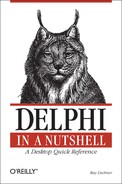Name
Class Keyword
Syntax
typeName= classDeclarations... class function ...; class procedure...; end; typeName= class(BaseClass) ... end; typeName= class(BaseClass); typeForwardDeclaredName= class; typeName= class(BaseClass,Interface name...)Declarations... end; typeName= packed class... typeMetaClass= class ofClass type;
Description
The class keyword
introduces a class declaration, and it starts the declaration of a
class method. If a semicolon appears immediately after the
class keyword, the declaration is a forward
declaration: it tells the compiler that the type name is a class
type, but provides no other information about the class. You must
have a complete class declaration later in the same type declaration
block.
The last example above shows the declaration of a metaclass type. A
variable of metaclass type can store a class reference. You can use
this variable in any expression that calls for a class reference,
such as calling a constructor or class method, or as the right-hand
argument to an is operator. (The
as operator, on the other hand, requires a static
class name, not a variable class reference because it performs a type
cast, and the compiler must know the target type.)
A class declaration must have a single base class and can have any
number of interfaces. If you omit the base class, Delphi uses
TObject. If you want to list any interfaces, you
must supply the name of a base class, even if that name is
TObject.
A class declaration contains zero or more sections, where each
section has a particular access level. The default access level is
public unless a class has RTTI (by using the $M or
$TypeInfo compiler directives or inheriting from a
class that has RTTI), in which case the default is published.
Each section starts with zero or more field declarations. After all the field declarations come method and property declarations. You can have any number of sections, and you can repeat sections with the same access level. Sections can appear in any order.
If you supply a base class, and a semicolon appears immediately after
the closing parenthesis, you can omit the end
keyword.
By default, each field is aligned, but you can use the
packed directive so fields start on byte
boundaries. See the packed keyword for details. If
you want every class and record to be packed, use the
$A or $Align compiler
directive.
Class Methods
A class method is similar to an ordinary method with the following differences:
A class method declaration begins with the
classkeyword. You must use theclasskeyword in the class declaration and in the method’s definition.You must call an ordinary method by invoking it from an object reference. You can call a class method by invoking it from an object reference or a class reference.
Inside a class method,
Selfrefers to the class and does not refer to an object. This means the method cannot use any fields because there is no object to store those fields.
Tips and Tricks
A class can implement any number of interfaces. Delphi matches interface method names with method names in the class. You can redirect interface methods to different methods in the class declaration with a method resolution clause, which has the following form:
procedureInterface.InterfaceMethod=MethodName; functionInterface.InterfaceMethod=MethodName;
The MethodName is the name of a method in
the containing class declaration. Redirection is especially important
when a class implements multiple interfaces, and two or more
interfaces have methods with the same name and arguments.
Examples
type TSimpleStream = class; TSimpleClass = class // Implicitly inherits from TObject. private // Sections can be in any order. A fStream: TSimpleStream; // common convention is to list sections public // in increasing order by access level. constructor Create(const FileName: string = ''), destructor Destroy; override; property Stream: TSimpleStream read fStream; end; TSimpleStream = class(TPersistent, ISequentialStream) private fHandle: THandle; fReadOnly: Boolean; protected // method of ISequentialStream function Read(Data: Pointer; Count: LongInt; BytesRead: PLongInt): HResult; stdcall; function Write(Data: Pointer; Count: LongInt; BytesWritten: PLongint): HResult; stdcall; public constructor Create(const FileName: string); overload; constructor Create(Handle: THandle); overload; destructor Destroy; override; procedure Assign(Source: TPersistent); override; published property ReadOnly: Boolean read fReadOnly write fReadOnly; end; // In Delphi's Open Tools API, the IOTAWizard and IOTAFileSystem // interfaces both have a method named GetIDString. The TVfsWizard // class implements both interfaces, and uses method resolution // clauses to select which method implements the interface methods. TVfsWizard = class(TInterfacedObject, IOTAWizard, IOTAFileSystem) private // methods of IOTAFileSystem function DeleteFile(const FileName: string): Boolean; function FileAge(const FileName: string): LongInt; function FileExists(const FileName: string): Boolean; function GetBackupFileName(const FileName: string): string; function GetFileStream(const FileName: string; Mode: Integer): IStream; function GetFileSystemIDString: string; function IOTAFileSystem.GetIDString = GetFileSystemIDString; function GetTempFileName(const FileName: string): string; function IsFileBased: Boolean; function IsReadonly(const FileName: string): Boolean; function RenameFile(const OldName, NewName: string): Boolean; // methods of IOTAWizard function GetWizardIDString: string; function IOTAWizard.GetIDString = GetWizardIDString; function GetName: string; function GetState: TWizardState; procedure Execute; // The following function is a convenience function that anyone // can call to get a reference to the global IOTAServices interface. class function Services: IOTAServices; end;
See Also
| Automated Directive, Constructor Keyword, Destructor Keyword, Function Keyword, Interface Keyword, Is Keyword, Packed Keyword, Private Directive, Procedure Keyword, Property Keyword, Protected Directive, Public Directive, Published Directive, Self Variable, Type Keyword, $A Compiler Directive, $Align Compiler Directive, $M Compiler Directive, $TypeInfo Compiler Directive |
